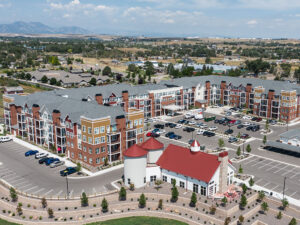The market for real estate in Denver continues to shine in 2025, as the Mile High City cements its reputation as a national leader in residential, commercial, and multifamily development. Thanks to strong demand, high quality of life, and an influx of new residents moving to Denver, the metro area’s real estate growth shows no signs of slowing down.
A Decade of Strong Growth in Real Estate in Denver
Denver ranks among the top 10 U.S. cities for real estate development activity over the past decade, outperforming many larger metros. Between 2013 and 2022, Denver issued an impressive number of building permits across sectors including multifamily housing, single-family homes, industrial, office, and retail construction.
This performance is remarkable given that Denver is the nation’s 19th-largest city but consistently competes with real estate powerhouses like Austin, Dallas, and Phoenix. For newcomers to Denver, this sustained development provides an abundance of housing options and thriving commercial hubs.
Multifamily and Single-Family Development in Denver
Multifamily construction in Denver has been particularly robust. From 2021 to 2022 alone, the city issued over 15,000 permits for apartment buildings, placing it among the top 10 cities nationwide for multifamily growth. As demand for urban living and rental options has surged, developers have responded with high-rise apartment complexes and mixed-use communities across neighborhoods like RiNo, Capitol Hill, and Cherry Creek.
Meanwhile, single-family housing in Denver remains strong as well. Though inventory remains tight, new builds in suburbs like Aurora, Lakewood, and Littleton offer newcomers options in more family-friendly environments. Over the decade, Denver issued more than 18,000 single-family permits, a testament to the city’s growth and resilience.
Commercial and Industrial Real Estate in Denver
On the commercial side, real estate in Denver continues to thrive. Over the last 10 years, Denver added more than 11 million square feet of new office space and 3.3 million square feet of new retail developments. Areas like the Denver Tech Center and LoDo have seen a boom in coworking spaces, headquarters expansions, and high-end shopping destinations.
Industrial development has also played a key role in the metro economy. From 2013 to 2022, Denver added roughly 13.5 million square feet of industrial space. Neighboring Aurora outpaced the city in this category, with 17.7 million square feet of new industrial development—impressive for a suburb with half the population.
Self-Storage: A Silent Winner in Denver Real Estate
One of the fastest-growing sectors of real estate in Denver has been self-storage. As residents continue to move, downsize, or simply seek extra space, self-storage demand has skyrocketed. Denver added 2.3 million square feet of storage space between 2013 and 2022, outperforming many peer cities.
Today, the average monthly rent for a storage unit in Denver is $126, roughly on par with the national average. This expansion supports a more flexible lifestyle for both long-term residents and those relocating to Denver and needing transitional storage space.
Why Denver Real Estate Remains a Smart Investment
The secret is out—real estate in Denver continues to be a strong investment in 2025. With its growing population, economic diversification, and top-tier outdoor amenities, Denver has proven its staying power in both boom and slowdown years.
From new high-rise condos in the heart of downtown to single-family developments in the metro’s outer edges, opportunities abound for homebuyers, renters, and commercial investors alike. For those moving to Denver, the city offers both strong appreciation potential and the quality of life that makes long-term residence appealing.
Exploring Denver’s Hottest Neighborhoods for Real Estate
If you’re relocating to Denver and looking for the right area to buy or rent, consider fast-growing neighborhoods like RiNo, Sloan’s Lake, Highlands, and Green Valley Ranch. Each offers a unique blend of amenities, walkability, and price points. As the city expands, expect new developments to continue stretching into surrounding communities like Thornton, Commerce City, and Westminster.




